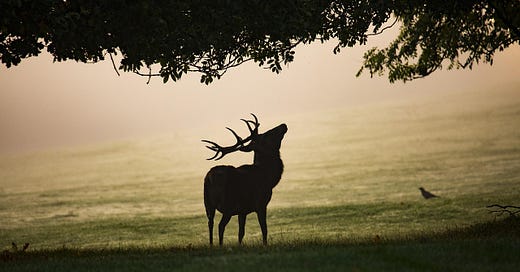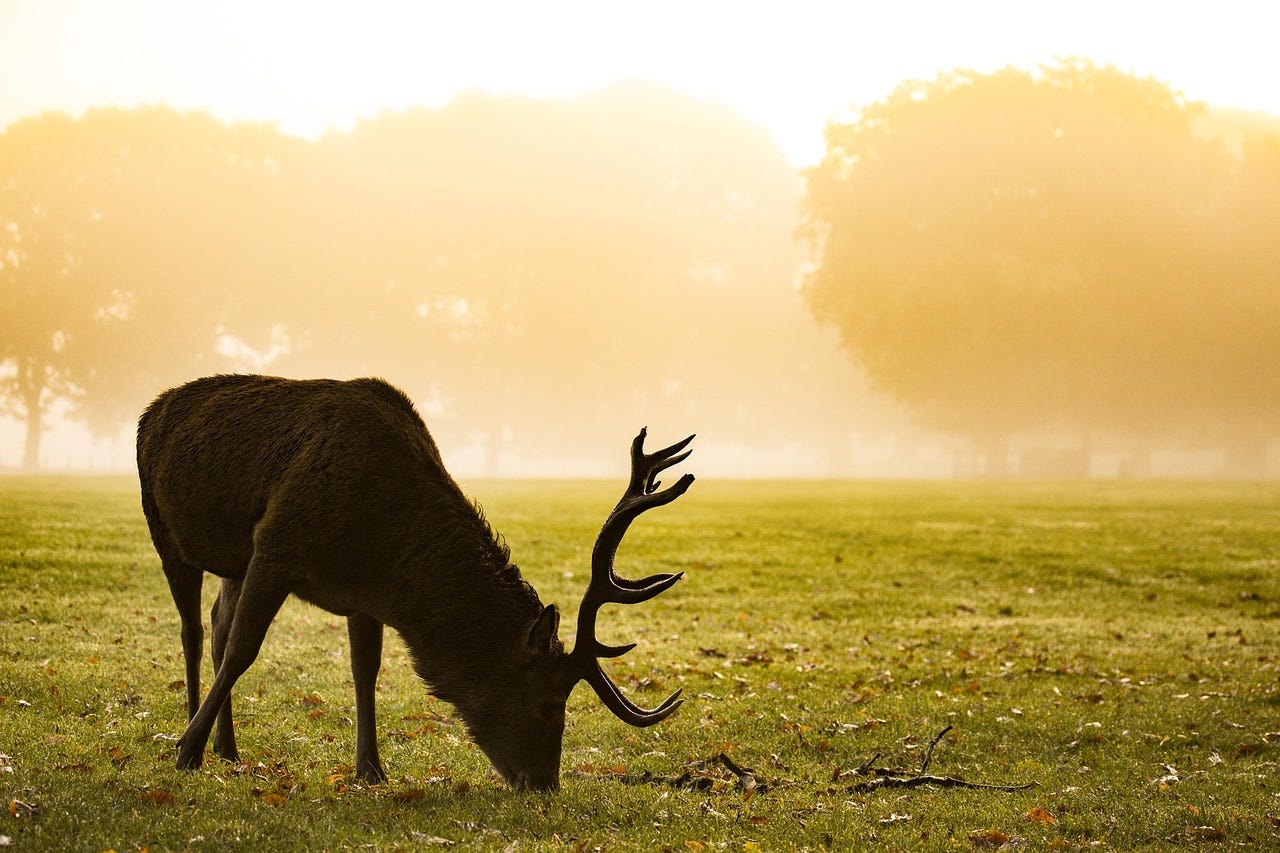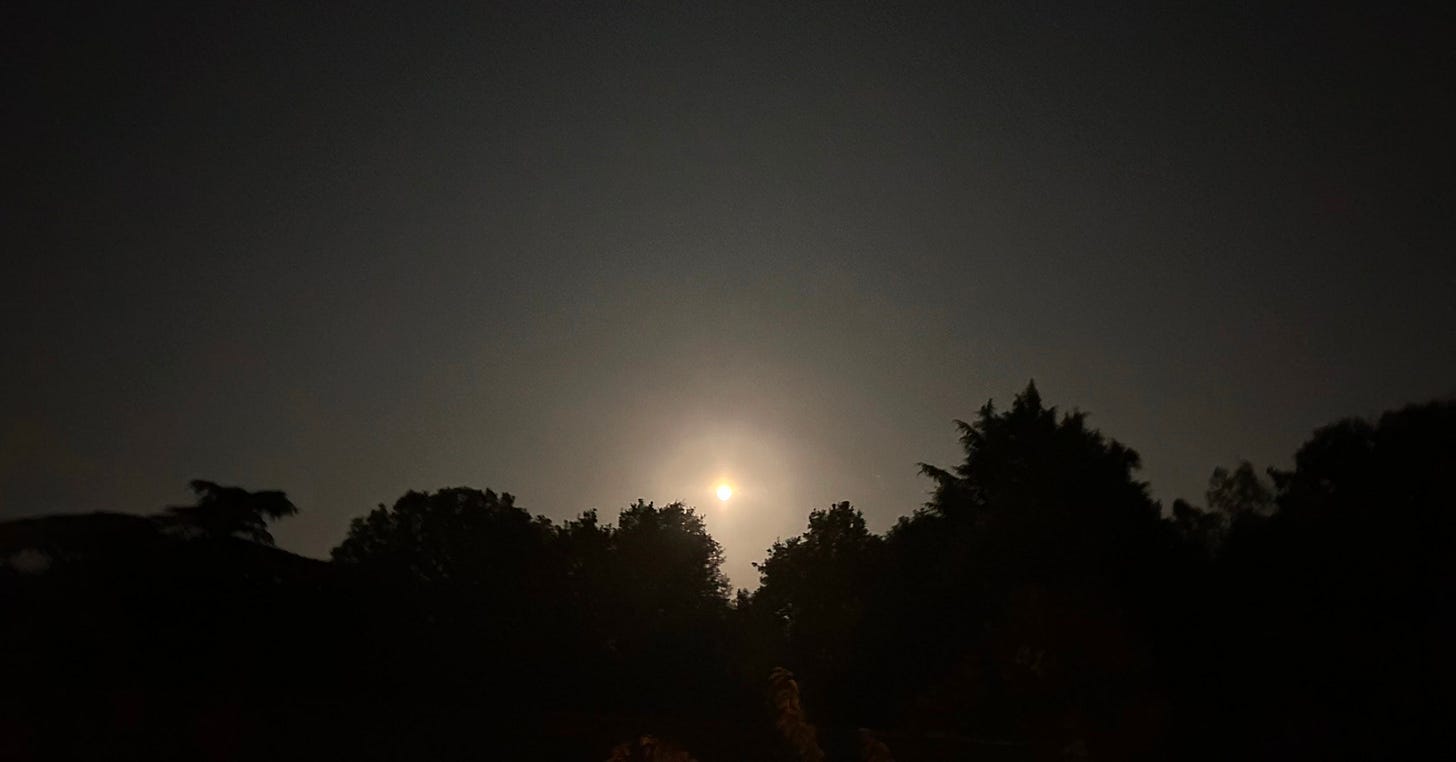“Absence doth sharpen love, presence strengthens it.” - Thomas Overbury (1856)
"The miscellaneous works in prose and verse of Sir Thomas Overbury,” now first collected: Edited with notes, and a biograph. account of the author by E. F. Rimbault", p. 190
The moon is in a constant cyclical dance with absence and presence, light and shadow. Tonight her alignment with the Sun, on the opposite side of Earth, reveals what we call her full face, yet one whole side of her remains in shadow. As I write, the Buck Moon, named after the sprouting of deer antlers at this time of year, is glinting through tree branches. I await her rise to full visibility.
“How does anyone learn to bear the loss, the separation, that every moment implies and at the same time find courage to affirm the value of the moment that follows?”
Jessie Taft (1882-1960) Social worker and philosopher “Time as the Medium of the Helping Process" Delivered at the Jewish Conference of Social Work, Cleveland, June, 1949. Jewish Social Service Quarterly, XXVI, No. 2 (December, 1949)
Depending on which lens you look through, our narratives of time celebrate the presence of some people, whilst absenting others. Jessie Taft was a groundbreaking philosopher and social worker who pioneered a school of functional, person-centred social work, and adopted children with her life partner Virginia Robinson. Like many women of her time, her work is often portrayed as orbiting the eminent men she worked with and influenced (Otto Rank and Carl Rogers). Whilst tracking down her story, I came across her article about Time which explores the paradox that to experience what Kirkegaard famously called the Fullness of Time, we have to face the inevitability of loss and absence whilst affirming our presence in the precious moments we have available to us. She quotes this poem:
Of Space and Time
THE man looks at the mountain with the fog
of distance on it lovelier than grass,
and then he lifts and slowly turns the glass
that calls it to him like a faithful dog.
Man is an animal at home in space:
the earth and sky are beautiful to him;
imagination presses at the rim
of all horizon for a farther place.He fits his wings to climb as eagles climb;
he fetches constellations in a mirror;
but time escapes him; time is unleashed terror;
he is an animal obsessed by time.
He has no instrument to hold it with
except his counted pulse, his measured breath.Edith Henrich - "The Quiet Corner" (1946) - pub William Sloane Associates
I have just finished reading the beautiful novel, Deafening, by Frances Itani in which the Canadian heroine, Grania, loses her hearing at age 5 from scarlet fever, entering a silent, yet richly communicative world. After experiencing the full presence of love with a hearing man, Jim, the couple endure a four-year absence during the horrors of WWI. The novel powerfully evokes the grief of sustained absence, as millions of people waited for letters or, blunt, brutal telegrams containing news of their loved one’s loss or wounding in war. For Grania’s war is not just one of arms, but of communication, whether through sign language, lip reading, speech or writing. The novel documents how letters were just as vulnerable as their authors to being lost, displaced, delayed, detonated or torpedoed. Beyond the tangible forms of communication, the absent beloved remains powerfully present in the unseen, hidden realms of the heart and mind, appearing in dreams and visions.
There is a time for presence and a time for absence.
In absence, presence speaks powerfully, whispering the unseen language of the heart, exerting a mysterious magnetism on the tides. The silence surrounding the song, absence creates replenishing retreats, pauses and rests in connections. Absence can hold the essence of connection, allowing it to heal and dance freely beyond the trials that can arise in presence. Yet sustained absence sends a million questions shooting through the void, and final absence is accompanied by intense grief and loss.
Like the moon, in today’s digital world we are both absent and present, hidden behind screens which set our faces aglow with words, memes, gifs, emojis, videos and music symbolising and signalling our existence, thoughts, feelings, ideas and intentions. Increasingly agile, creative technologies send round-the-clock content designed to mark our virtual presence. Our loved ones travel with us on products in our hands and pockets, enabling us to stay connected in ways beyond anything those enduring WWI could have dreamed of.
‘Mind the gap’ punctuates the arrival of trains on the London Underground - and truly, we do. Increasingly conditioned to expect instant gratification and dopamine hits, our minds fill time gaps with questions - ‘why didn’t they text back? are they ghosting or simply busy? What did they mean when they said that?’ For whilst omnipresent, virtual connection is also disembodied - we are missing vital elements such as body language, eye contact and warmth. As a million digital requests tug on our heart and head, we become simultaneously absent and present IRL. As hopes of presence rise with the flicker of words across screens and fall back into absence, connection can be either eroded or enhanced as the tides of time roll on.
Red stag in mist photos: Diana Parkhouse, Pixabay
‘You need to buck up your ideas or else…’ was one of those punitive English phrases expressed by exasperated parents and teachers back in the day. When we remove the unhelpful threat, the jolt to buck up and get present to what we are creating with both our absence and presence can nonetheless be purposeful.
Human connections can easily wash away in the tides of time, subsumed in the daily currents of demands and obligations. Presence takes a stand and shows up, saying - 'this matters, I will make time, I will not let this connection get washed away.' Presence requires us to commit, to insist - ‘I will be here, with you at this time and place, for these precious allotted moments.’ To be present requires an act of will to refuse a million reasons to be absent. Presence is, therefore, time mastery. It is a bucking of our antlers at the tides of time. When time cannot be made, the time soon arrives to surrender connection to the tides.
So as the moon climbs from her hiding place amongst the trees, I wonder where I need to show up and be present? Where would absence bring release and rest? Whose absence do I feel sharply? Whose presence do I feel strengthened by? Where do I need to buck time and direct my attention to make the most of this moment, and the unknown number of precious moments still available to me in life?
And there she is now, in this moment seen and unseen, absent and present, climbing above the trees.









